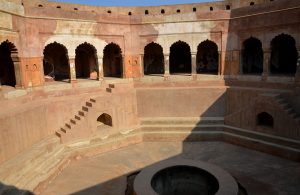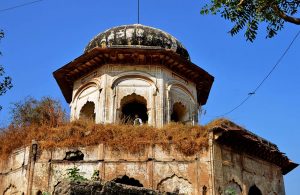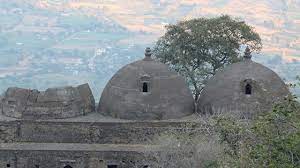Think of Gurgaon and the image that instantly comes to your mind is that of a busy business hub, right? Its swanky malls, trendy restaurants, chic pubs, and flashy nightclubs, all lend the place a hip and happening vibe. That’s probably why many tourists don’t consider Gurgaon as the place with any historical significance. However, there are a few historical places in and around Gurgaon that are worth a visit.
1. Farrukhnagar Fort, Gurgaon

Farrukhnagar Fort owes its origin to Faujdar Khan, Farrukhnagar’s first Nawab. He built it as a grand citadel in 1732. It is a huge octagonal structure that displays elements of the Mughal style of architecture. Among the most impressive features of the fort is the Dilli Darwaza or the Delhi Gate. This gateway, along with the Jhajjari Darwaza and the Patli Darwaza, forms the three entryways to the town. Today, much of the fort is in ruins, but it still is one of the top historical places in Gurgaon.
- Location: Farrukhnagar, Gurgaon
- Timings: 24 x 7
- Entry Fee: Free
2. Jama Masjid, Gurgaon
The Jama Masjid in Farrukhnagar is another splendid example of Faujdar Khan’s architectural prowess. This place of worship is built in red sandstone and features domes and minarets. An interesting thing to note is that it has two slabs made of red sandstone that depict Arabic inscriptions dating back to the 13th-century. It is believed that these two slabs originally belonged to an ancient mosque located in Sultanpur before they were brought here.
- Location: Farrukhnagar, Gurgaon
- Timings: NA
- Entry Fee: Free
3. Sheesh Mahal, Gurgaon
There’s no doubt that the Sheesh Mahal is one of the best historical places to visit in Gurgaon. This palace was built by Faujdar Khan in the early part of the 18th century. Designed as a double-storied structure, this palace boasts of a lovely baradari or pavilion that has no less than 12 entrances. Intricate mirror inlay ornamentation adorns the interiors of this palace, lending the structure its name, which means ‘the Palace of Mirrors’. The large courtyard of the palace has a water channel that links it to a nearby stepwell. The palace premises also houses a memorial built for the martyrs from Farrukhnagar who had taken part in the 1857 uprising for independence.
- Location: Farrukhnagar, Gurgaon
- Timings: NA
- Entry Fee: Free
4. Sethani Ki Chhatri, Gurgaon

Sethani Ki Chhatri is a beautiful cenotaph designed as a two-storied chhatri or dome-shaped pavilion. You can find eight arched openings at each story of the structure. Decorative floral motifs are a common theme you can see in this structure. It is believed that this place was built for the wife of a merchant. An inscription on a fresco on the ceiling dates the structure to 1861. Decorated with frescos and inscriptions, Sethani Ki Chhatri is definitely one of the must-see historical monuments in Gurgaon.
- Location: Farrukhnagar, Gurgaon
- Timings: NA
- Entry Fee: Free
5. Baoli Ghaus Ali Shah, Gurgaon
Baoli Ghaus Ali Shah is an 18th-century stepwell located near Farrukhnagar Fort. It was built by a local chief named Ghaus Ali Shah and hence its name. It is an octagonal stepwell that runs three stories deep. Designed with verandas, arches, and elaborate stone staircases, Baoli Ghaus Ali Shah resembles the Turkish hammams in its structure.
- Location: Farrukhnagar, Gurgaon
- Timings: NA
- Entry Fee: Free
6. Badshahpur Fort and Baoli, Gurgaon
Badshahpur Fort is one of the lesser-known forts near Gurgaon. Also known as Badshahpur Qila, this fort dates back to the Mughal era. It served as the residence of one of the wives of the last Mughal Emperor, Bahadur Shah Zafar who often came here to meet his begum. This historic fort has lost much of its grandeur and glory today and remains in a state of ruin. But you can still see the Mazar of Peer Baba and a tunnel inside the premises. Not far from the fort is an old stepwell which was once a part of this complex but is privately owned today.
- Location: Badshahpur, Gurgaon
- Timings: NA
- Entry Fee: Free
7. Mosque and Sarai of Ali Vardi Khan, Gurgaon
Alivardi Khan, the Nawab of Bengal, built this mosque and sarai or rest house back in the 18th century when the Mughal King Mohammad Shah II was ruling Delhi. What makes this mosque stand out from other places of worship is that the mosque complex included a rest house as well as a well. The mosque and the sarai were built for travelers to rest for a while when passing through that route. Today, the sarai may not be in use anymore, but it stands as a reminder of those days when hotels were unheard of.
- Location: Gurgaon
- Timings: NA
- Entry Fee: Free
8. Digambar Temple, Gurgaon
The Digambar Temple in Gurgaon is a Jain temple built during the Mughal rule. It temple traces its origins back to the 17th century and is known for its serene ambiance. This place of worship is dedicated to Lord Mahavira, the 24th Tirthankar of the Jains. There is a bookstore located inside the temple premises where you can find several artifacts and study materials related to Jainism.
- Location: Badshahpur
- Timings: 6:00 am to 9:00 pm
- Entry Fee: Free
9. The Church of Epiphany, Gurgaon
Nestled in a quiet locality, the Church of Epiphany has been standing tall for more than 150 years. Way back in 1866, this lovely church was consecrated by the Bishop of Calcutta. The church was initially built for a small group of British officers serving in this region during that time. Once you walk up to the main building, you can’t miss the Colonial-era decor that adorns this place. Its tall windows, small bell tower, and sloping roofs, all exude an old world charm.
- Location: Officers Colony, Civil Lines
- Timings: NA
- Entry Fee: Free


